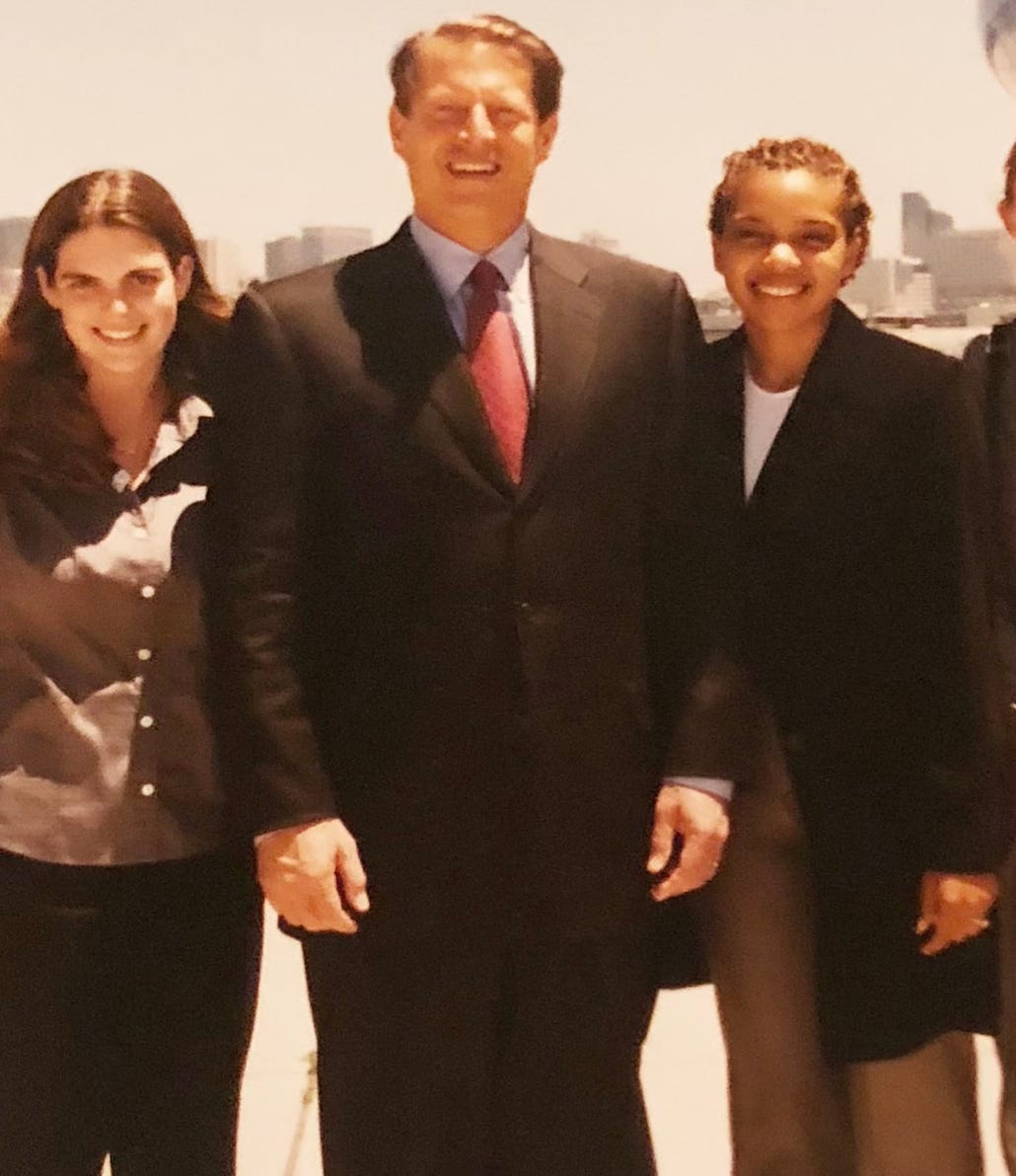WADING IN THE DEEP END
A LEADERSHIP JOURNEY FROM CAMPAIGN TO CLASSROOM
I was 23 when my body delivered my first real lesson about high-stakes leadership. Standing in Georgetown Hospital's emergency room, Nokia phone still in hand, coordinating campaign logistics, I heard the doctor's stern voice: "That's actually the problem. Turn off your phone." My legs had turned to jelly, stress knots threatening to become blood clots – an early warning about the price of operating at the highest levels before you think you're ready.
I had walked into that empty gray office on 18th and K Street six months earlier, wires hanging from the ceiling, a few office chairs scattered around a fold-up table. On the wall hung Vice President Gore's speech about his sister who died of cancer. The emptiness of that room would soon be filled with the intensity of a presidential campaign, and I was about to learn what it meant to run full speed into opportunity.
Working on the Vice President's campaign was like wading in the deep end of the ocean instead of learning to swim at the shore. Each day brought new challenges: managing donor events, coordinating complex logistics, navigating the intricacies of political relationships. "This is Sunday, Pi, we missed two days!" became a regular reminder that in national politics, time doesn't move in normal cycles. The stakes were always high, the pressure constant, the learning curve vertical.
Each city taught its own lesson in power and influence. Baltimore showed me how a single powerbroker could control an entire city's political machinery. Sag Harbor demonstrated how elite networks quietly shaped national priorities. These weren't just fundraising events – they were masterclasses in how American politics actually functioned.
The campaign taught me that sometimes opportunities arrive before you think you're ready. I learned to coordinate multi-city fundraising tours, to manage relationships with power brokers in major cities, to understand the delicate dance of political access and influence.
Then came teaching.
Walking into my elementary school classroom in Columbia Heights, just blocks from where those campaign policies were crafted, didn't feel like stepping down from national politics – it felt like stepping into where politics actually lived. Here, every federal decision, every policy debate, every campaign promise had a face and a name and a future sitting in those small chairs.
The skills translated in unexpected ways. Campaign logistics became lesson planning. Donor management became parent communication. Understanding power dynamics in Washington helped me navigate educational bureaucracy. But teaching added a crucial dimension to my understanding of leadership – the ability to see how high-level decisions cascade into community impact.
Both roles demanded immersion in complex systems before I felt ready. Both required learning while doing, adapting in real-time, and maintaining composure under pressure. The campaign taught me how national decisions take shape; teaching showed me how they land in real communities.
Working in spaces where policies were crafted, then in classrooms where those policies played out, gave me a unique vantage point. I witnessed how decisions made in the thin air of Washington manifested in dense communities just down the street. This wasn't just about education reform on paper – it was about seeing how each policy decision rippled through actual classrooms, affecting real students and families.
The greatest lesson from both worlds was this: sometimes the most significant opportunities of our lives don't arrive when we're ready – they arrive when they arrive. The key isn't being fearless; it's being willing to wade into the deep end anyway, to learn while doing, to understand that being slightly out of your depth is often exactly where growth happens.

Leadership isn't just about learning to swim in the deep end – it's about understanding both the view from above and below the water. It's about knowing how decisions ripple from K Street to classroom seats, and having the courage to operate in both worlds, even before you feel ready.
Those early years shaped a crucial understanding: not every job is just a job. Sometimes it's an opportunity that arrives before you feel ready, demanding that you rise to meet it. And sometimes, that's exactly where you need to be – in the deep end, learning to swim by swimming.
This bi-weekly PSA is written by Pi-Isis S. Ankhra, speaker, writer, executive coach and business strategist. She is the founder and president of P.S.314, a consulting practice supporting social impact organizations in building power, sustainability and authentic partnerships.




